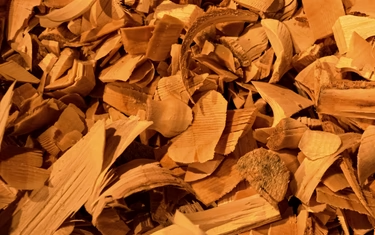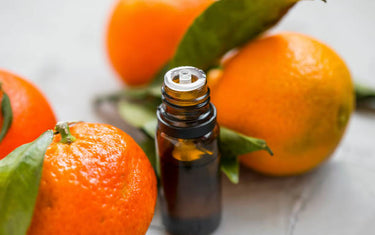6 min read / 28 January 2022 / Laura Garvin Gomez
Benefits and Uses of Amyris Oil
Amyris essential oil can grant us younger skin and a more peaceful state of mind.

Sometimes called West Indian Sandalwood, amyris has gained a lot of notoriety as a sandalwood substitute.
The wood was actually mistaken for sandalwood until the late seventeenth century, when the leaves were studied and the error was realised.
Since then, amyris essential oil has been used to clean and treat wounds as well as support the respiratory systems. Its fresh, woody scent has remained a popular alternative to sandalwood in perfumery.
It should be noted, however, that even though the scent of the two oils may be close enough to trade them for each other, they are distilled from different plants and therefore have different uses and benefits.
What is Amyris Essential Oil?
Indefinable by the botanical name Amyris Balsamifera, amyris essential oil is steam distilled from the bark of the amyris tree, which is native to the central and southern regions of the Americas.
Amyris oil is usually pale yellow to brownish yellow in colour, and provides a gentle woody scent with sweet, balsamic notes at its centre.
Blending well with oils like citronella and lavender, amyris oil is particularly popular amongst soap makers due to its complex base notes.
What are the health benefits of Amyris Essential Oil?
In spite of its frequent comparisons to sandalwood essential oil, amyris essential oil does not carry to same benefits for the body and mind. It is, however, a very useful oil in its own right.
Some of the key benefits of amyris essential oil include:
- Boosting the appearance of skin
- Treating coughs and colds
- Acting as a natural cleaning agent
- Repelling insects
- Relieving stress and promoting sleep

Is amyris essential oil good for the skin?
Amyris oil contains many antioxidant components, namely valerianol and three types of eudesmol.
Antioxidants are not only useful for protecting the overall health of the body, but they can also be highly beneficial for the skin. They can help to prevent inflammation and irritation as well as signs of premature aging, promoting a youthful appearance.
Amyris oil is also an emollient, which means that it can naturally soften the skin and improve its texture. Its antibacterial properties can deeply cleanse pores and remove unwanted microbes from the skin, helping to prevent breakouts.
All in all, amyris oil can keep skin clear, young, and glowing when applied with a carrier oil.
Can amyris oil help treat coughs and colds?
Amyris oil has been used extensively to treat coughs and colds over the years.
Its anti-inflammatory abilities are useful for soothing sore throats, whilst its antibacterial properties can help it to attack the root cause of the symptoms.
Research has also shown that amyris oil can be particularly useful when it comes to treating respiratory tract infections.
A study in 2021 found that amyris oil showed significant activity against nine pathogens responsible for these infections, meaning its use may help to quickly treat the culpable bacteria and efficiently clear up symptoms.
Is amyris essential oil a natural cleaning agent?
It’s well documented that amyris oil has strong antibacterial properties. The oil is often used to combat a wide range of pathogens in the body, on the skin, and in the home.
One study in 2020 found that amyris oil actually showed stronger activity against the bacteria responsible for a staph infection than the known persister drug, tosufloxacin.
Using amyris oil in homemade cleaning sprays can help keep harmful bacteria out of the surfaces of your home for good.
Can amyris essential oil be used as an insect repellent?
Amyris oil is widely regarded as a highly effective insect repellent.
It has historically been used to repel mosquitoes when diffused, sprayed, or used in candles, and research in 2010 also showed that it was repellent to two different species of ticks.
Gnats and biting flies are known to find the aromas of amyris oil extremely unpleasant too, so diffusing the oil around your home may be a good way to keep them out.
Does amyris oil relieve stress and promote sleep?
Amyris is considered a calming, stress-relieving oil, able to reduce symptoms of anxiety and boost positivity. It is also used to promote sleep and improve symptoms of insomnia - especially insomnia triggered by stress.
These benefits are said to be attributed to the effect that amyris oil has on the limbic system in the brain. Once inhaled, the oil can stimulate several neurotransmitters that are responsible for mood and stress levels.
Diffusing amyris in your living space can help to keep stress levels low as well as promote healthy sleeping patterns.
How to use Amyris Essential Oil
Amyris essential oil, like many plant-based oils, is extremely versatile in its uses. If you need some help implementing it into your routine, here are some of our favourite ways to make the most out of amyris' benefits.
Aromatherapy
Sweet and woody with a calming, refreshing note, amyris essential oil is ideal for adding to your electric diffuser or oil burner.
Its stress-relieving properties can provide a sense of peace in your day-to-day, while diffusing the oil just before bed can help tackle overthinking and restlessness throughout your night's sleep.
If you're struggling with the stubborn symptoms of cold and flu, adding some amyris oil to a hot bath can also help to clear the airways and revive your senses.
Skincare
Amyris oil is famed for its powerful effects on the skin. Try combining a few drops of amyris with your favourite plant-based carrier oil - such as coconut or rosehip - and adding it to your skin as an all-natural cleanser.
You can also sprinkle some amyris oil into your existing skincare products for an additional boost of wellness.
Cleaning
If you like giving your surfaces a top-up between deep cleans, amyris oil may be just the ingredient to keep your home smelling fresh.
Add a few drops of oil to a glass spray bottle with water and an emulsifier (like dish soap) and shake well to keep your surfaces gleaming.
Insect repellent
Looking to protect yourself as well as your home from pesky insects in the summertime? Try adding the oil to a spray bottle with your favourite carrier oil and applying it throughout the day.
History of Amyris Essential Oil
Due to its late discovery in the seventeenth century, the history of amyris essential oil is largely unknown beyond its capabilities as a sandalwood substitute.
Derived from the Greek word meaning "strongly fragrant", amyris oil's main appeal has been in the world of perfumery, and uses in this area continue to grow as more is unveiled about what this sweet-smelling oil can do for our minds and bodies.

Although it has a similar scent, amyris is far more than just a second-rate sandalwood. It is an incredibly useful oil in its own right, with many soothing, protective benefits for our bodies.
|
Product Name |
100% Pure Amyris Essential Oil |
| Botanical Name | Amyris Balsamifera |
| Scent Type | Earthy |
| Benefits & Uses | Skin, Insect Repellent, Sleeping Aid |
| Suitable for Diffusers? | Yes, this amyris essential oil is perfect for diffusers. |
| Suitable for Candles and Soaps? | Yes, this amyris essential oil is perfect for candle and soap making. |
| Extraction Method | Steam Distillation |
| Bottle Type | Tamper proof and UV resistant |











